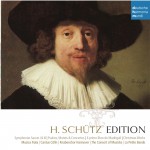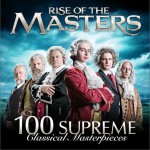标签:
专辑文案:(声明:文案均由授权方提供,并不表示一听赞同其立场或观点)
Bach was best known during his lifetime as an organist, organ consultant, and composer of organ works in both the traditional German free genres—such as preludes, fantasias, and toccatas—and stricter forms, such as chorale preludes and fugues. At a young age, he established a reputation for his great creativity and ability to integrate foreign styles into his organ works. A decidedly North German influence was exerted by Georg Böhm, with whom Bach came into contact in Lüneburg, and Dieterich Buxtehude, whom the young organist visited in Lübeck in 1704 on an extended leave of absence from his job in Arnstadt. Around this time, Bach copied the works of numerous French and Italian composers to gain insights into their compositional languages, and later arranged violin concertos by Vivaldi and others for organ and harpsichord. During his most productive period (1708–14) he composed several pairs of preludes and fugues and toccatas and fugues, and the Orgelbüchlein ("Little organ book"), an unfinished collection of 46 short chorale preludes that demonstrates compositional techniques in the setting of chorale tunes. After leaving Weimar, Bach wrote less for organ, although his best-known works (the six trio sonatas, the "German Organ Mass" in Clavier-Übung III from 1739, and the Great Eighteen chorales, revised late in his life) were all composed after his leaving Weimar. Bach was extensively engaged later in his life in consulting on organ projects, testing newly built organs, and dedicating organs in afternoon recitals.
本专辑因版权原因或者内容问题不提供试听与下载.
专辑《Scales From Weimar》的歌曲列表
古典音乐的精选专辑
-
 瓦格纳盛宴 ——纪念瓦格纳诞辰200周年 播放整张专辑 2014-09-19
瓦格纳盛宴 ——纪念瓦格纳诞辰200周年 播放整张专辑 2014-09-19 -
 Dvorák: Piano Quintet Op. 81 / String Quartet Op. 96 德沃夏克:钢琴五重奏 Op81/弦乐四重奏 Op96 播放整张专辑 2013-07-05
Dvorák: Piano Quintet Op. 81 / String Quartet Op. 96 德沃夏克:钢琴五重奏 Op81/弦乐四重奏 Op96 播放整张专辑 2013-07-05 -
 Heinrich Schütz Edition 播放整张专辑 2013-07-15
Heinrich Schütz Edition 播放整张专辑 2013-07-15 -
 2013维也纳美泉宫夏季音乐会 播放整张专辑 2013-06-19
2013维也纳美泉宫夏季音乐会 播放整张专辑 2013-06-19 -
 尼伯龙根的指环•精选 Der Ring des Nibelungen THE HIGHLIGHTS 播放整张专辑 2013-05-22
尼伯龙根的指环•精选 Der Ring des Nibelungen THE HIGHLIGHTS 播放整张专辑 2013-05-22 -
 100 Supreme Classical Masterpieces: Rise of the Masters 播放整张专辑 2010-11-30
100 Supreme Classical Masterpieces: Rise of the Masters 播放整张专辑 2010-11-30 -
 帕海贝尔:卡农绝赞 播放整张专辑 2013-03-22
帕海贝尔:卡农绝赞 播放整张专辑 2013-03-22 -
 醉笛 播放整张专辑 2013-03-18
醉笛 播放整张专辑 2013-03-18









